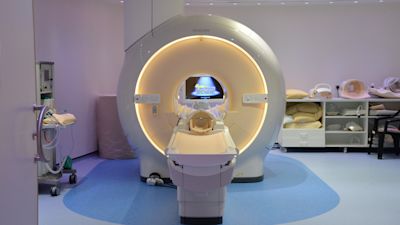Screening for prostate cancer could 'significantly' reduce deaths, study suggests

Tap above to watch Duncan Golestani's interview with Professor Caroline Moore
Using MRI scans to screen men for prostate cancer could “significantly” reduce deaths from the disease, researchers have suggested.
Scientists said current tests used to check for prostate cancer have been linked to over-diagnosis and over-treatment of low-risk cancer.
Prostate cancer is the most common cancer found in men.
The Reimagine study saw 303 men aged between 50 and 75 have a screening MRI and a PSA test.
Of the total, 48 (16%) had an MRI which indicated the presence of prostate cancer, despite having a normal PSA density.
But 32 had lower PSA levels than the current screening benchmark of 3ng/ml, meaning they would not have been referred for further investigation.
After NHS assessment, 29 men were diagnosed with cancer that required treatment, 15 of whom had serious cancer and a PSA of less than 3ng/ml.
Three men (1%) were diagnosed with low-risk cancer that did not require treatment.
The study was led by University College London, University College London Hospitals NHS Foundation Trust and King’s College London and is published in medical journal BMJ Oncology.
Professor Caroline Moore, consultant surgeon at UCLH, chief investigator of the study and NIHR research professor, said the findings are “sobering” and “reiterates the need to consider a new approach to prostate cancer screening”.
“Our results give an early indication that MRI could offer a more reliable method of detecting potentially serious cancers early, with the added benefit that less than 1% of participants were ‘over-diagnosed’ with low-risk disease,” she added.
Prof Mark Emberton, consultant urologist at UCLH, said: “The UK prostate cancer mortality rate is twice as high as in countries like the US or Spain because our levels of testing are much lower than other countries.
“Given how treatable prostate cancer is when caught early, I’m confident that a national screening programme will reduce the UK’s prostate cancer mortality rate significantly. There is a lot of work to be done to get us to that point, but I believe this will be possible within the next five to ten years.”
Prof Sir Mike Richards, chairman of the UK National Screening Committee (NSC), said the organisation does not currently recommend prostate cancer screening “because there is no clear evidence that the benefits outweigh the harms”.
However, it is preparing to look at various proposals.
He added: “The UK NSC will soon commission a major piece of work to consider six prostate cancer screening proposals that were submitted during its annual call for topics.
“These include targeted and risk-stratified screening proposals for screening groups of men at higher risk due to factors such as ethnicity and family history.”
Another trial, known as Limit, is being conducted with a much larger number of patients, which the research team said is the “next step towards a national prostate screening programme”.
The trial will also attempt to recruit more black men, after the team behind Reimagine found they were much less likely to respond to the invitation to screening than others.
What are the symptoms of prostate cancer?
Prostate cancer is the most common cancer found in men and, at the moment, those aged over 50 can request a PSA test if they are experiencing symptoms.
Symptoms of prostate cancer can include:
Needing to pee more frequently, often during the night;
Needing to rush to the toilet;
Difficulty in starting to pee (hesitancy);
Straining or taking a long time while peeing;
Weak flow;
Feeling that your bladder has not emptied fully;
Blood in urine or blood in semen.
Want a quick and expert briefing on the biggest news stories? Listen to our latest podcasts to find out What You Need To know...